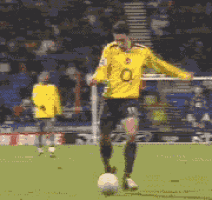We were on a trip in Scotland and walking through a somewhat shady neighbourhood. These 2 kids were walking towards us and randomly passed a football to me, expecting me to pass it back.
Is this a usual occurrence? I have never had this happen in my country but I have seen it done for videos. I’m asking about the UK specifically because I feel like you guys have an interesting street football culture. Maybe I’m wrong and this is a normal thing in lots of countries.
Not common, but also not unexpected. It definitely used to be an occasional thing when I was younger (80s - 90s, Yorkshire). If you passed it back, you got a “wahey!” or a “yeah!” “And he’s in on goal!” or something suchlike. If you ignored it, you got a “boo!” or a “referee!” or a “he’s missed it” in a sort of commentators voice.
It’s quite rare to see kids playing with a football at all where I live now - though it’s probably just happening a few streets away where there’s less car traffic.
Happens a lot in Liverpool. You are also allowed to say “go 'ed lad, giz a header!” and they are obliged by tradition to punt it to you but you’d better be sure you can nod it in or they’ll follow down the street calling you all sorts.
On me ed la
Misses
Ya shitouse. Ya arlarse.
Ya spanner!
Callin me arlarse for, ye helmet? Evvyimlad
Second this, in fact round my way you just need to make eye contact and a nod to anyone with a footy and you’re in the game.
Never seen that, but while walking the dog people sometimes kick the ball over towards you accidently and expect you to kick it back to them. Then the fear sets in…

I’m in my 50s. This is not something that I have ever encountered in the street.
Perhaps, when walking through a park or similar, when I was in my teens or twenties, some kids might have kicked a ball in my direction a couple of times, with the hope/expectation that I would return it, but that it about as close as I have experienced.
I’ve never seen it before but you might be expected to pass a ball back if it’d been kicked over accidentally. Scotland has its own ways though.
It’s common in South American countries.




